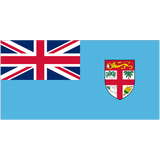
Pacific Nations face tough task at Rugby World Cup
Since its inception the Rugby World Cup has relied on Pacific Island nations to provide the tournament with flair, excitement and memorable moments of drama.
The same will likely true in Japan, where if Tier One nations are going to be upset by anyone other than the tournament hosts, those shocks will likely be caused by Fiji, Samoa and Tonga.
Teams from the Pacific islands are immensely popular around the world and their appearances at the World Cup are likely to attract large and admiring crowds.
But an appreciative welcome won't disguise the fact that the Pacific nations begin the tournament under a considerable handicap; struggling to close the gap between themselves and the top-tier teams because of a scarcity of resources and restricted access to their own players.
More than one-fifth of all professional rugby players — and an estimated 15% percent of players at the World Cup — claim Pacific islands heritage. New Zealand, Australia, England, Japan, Wales and the United States are among the countries with rosters containing players from the Pacific islands.
Elite club competitions in England, France, New Zealand, Australia and Japan would be less sustainable without the contribution of Pacific Island players. But those players then become available to their home nations seemingly only at the discretion of their clubs, and some have been reluctant in recent years about releasing players for test matches both because of issues of timing and concern about injuries.
That makes preparations for events like the World Cup doubly hard for the Pacific nations as they try to assemble squads.
International funding for high-performance programs in the Pacific fall well short of what may be necessary to allow those counties to compete with others on a level playing field.
The growing gulf between Tier One nations and the Pacific Islands was graphically demonstrated when Tonga lost 92-7 to New Zealand in its last warm-up match ahead of the World Cup. Samoa provided some hope when it stretched an under-strength Australia lineup in its last match before Japan.
Fiji has prepared steadily, gradually building its team to full strength through the Pacific Nations Cup and Pasifika Challenge as more of its players became available. While it lost its Pacific Nations Cup title to Japan, it showed it has the potential to upset top teams at the World Cup by playing its athletic, high-tempo style.
In the opening Pool D game, Fiji will face an Australian lineup which will likely contain four players of Fijian heritage, making the Pacific diaspora more evident.
France-based lock Leone Nakarawa said his teammates cannot concern themselves with the large number of Fijian players who will be playing at the World Cup for nations other than Fiji.
"Other Fijians play for other countries for their own personal reasons," he said. "We don't want to think or are bothered about them. We want to focus on what we can do and are tasked to achieve at the World Cup."
Fiji will play in Pool D in Japan with Australia, Wales, Georgia or Uruguay and is in with a chance if it can upset Australia or Wales of advancing to the knockout rounds.
Its challenge will be based around outstanding ball-handling forwards such as Nakarawa and captain Dominiko Waqaniburotu and world-class backs such as leading try-scorer Vereniki Goneva and Semi Radradra.
Samoa is drawn in Pool A with No. 1-ranked Ireland, Scotland, Japan and Russia, while Tonga plays in the tournament's toughest pool with England, France, Argentina and the United States.
"I'm fixated on making the playoffs," Tonga coach Toutai Kefu said. "We need to win three games for that.
"We're in a tough pool, there's no doubt about it. We just need to get together and believe in what we're doing and believe that we can make it. I certainly think we can."
Samoa caused one of the most memorable World Cup upsets when it beat Wales to reach the quarterfinals in 1991. Its preparation has been affected by injuries but it showed in its 34-15 loss to Australia recently that it has both spirit and talent.
It will start with a likely win over Russia, then a critical clash with Scotland before facing hosts Japan.
____
More AP sports: https://apnews.com/apf-sports and https://twitter.com/AP_Sports
